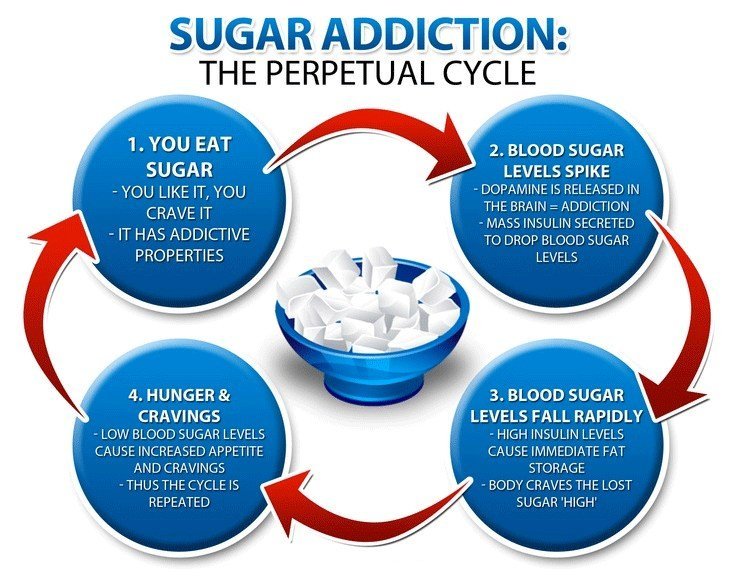Contrary to what some people may think, sugar doesn’t actually increase mental performance. Glucose, a fundamental substance in the correct functioning of the brain, helps us with the most intense intellectual tasks. A drop in glucose levels can lead to poorer performance on tasks involving memory, learning or attention. So why doesn’t brain performance improve with sugar?
The maintenance of an optimal glucose level has nothing to do with the consumption of refined sugar or sugar laden products. On the contrary, sugar produces energy peaks that rapidly descend, worsening cognitive function. To maintain an optimal glucose level, it’s necessary to consume foods that release glucose slowly and continuously over time. Some of these foods are those containing complex carbohydrates such as cereals, bread, pasta, potatoes or those foods containing simple carbohydrates such as fruits.
Sugar produces in our brain a similar effect to some drugs. Researcher Monica Dus from the University of Michigan investigated the effect of sugar on our brain using fruit flies.[1] According to Dus, when we eat, we do it for the “reward” that food generates in our brain, not for the need to eat. He also found that the main attraction of what we ingest is its taste. This has led to food industry brands being very interested in creating artificial flavors that attract consumers rather than preserving their nutritional values from food. Sugar is directly involved in flavor modification.
When ingested, sugar causes the brain to secrete dopamine, a substance present in many drug addictions. The mechanism involved in the “addiction” to sugar thus becomes comparable to that involved in cocaine addiction. In fact, according to a study carried out by Lenoir, Serre, Cantin and Ahmed at the University of Bordeaux, it is shown that sugar exceeds the reward levels we obtain with some drugs, which can be more addictive than cocaine itself.[2]
“A diet rich in refined sugar modifies the brain so that it is no longer able to distinguish how many calories the body is taking in. Therefore, a diet rich in sugars will make you eat much more than you need. Which in the long run is closely related to developing obesity.”- Monica Dus.
How to stop the sugar addiction cycle?
- Through mindfulness we can teach our brain not to fall into the trap. This concept refers to the concentration on the here and now of the experience we live. If we try to savor an artificial food for a minute with our eyes closed, we can see how the sensation is more unpleasant than we remembered. Our taste is greatly influenced by the marketing strategies designed to make products connect directly with our emotional brain. The way to break this vicious circle is to introduce varied foods with a high nutritional value into our diet, eliminating refined sugars and other sugar laden processed foods.
- Don’t shop on an empty stomach. Avoid supermarkets or other food stores while hungry, as well as eating alone.
- Cook at home as often as possible and include nuts, fruits, good quality cereals, etc. in your daily foods.
- Moderate your intake of processed foods. Indulge occasionally but focus on healthier foods.
- Educate/Teach healthy lifestyles to the young . Because little ones absorb information like sponges, teach them healthy eating habits, and practice alongside them. Eat healthy meals together, and let them help you prep your meals. It may get them more excited about eating healthy since the delicious meal is something they helped you create. Even advocating the implementation of health education in schools can be beneficial.
- Enhance your hormones and neurotransmitters. Certain foods help increase or decrease certain hormones that might affect sugar intake such as cortisol. Cortisol can increase your sugar cravings so by lowering it there is more chance of not indulging in unnecessary sweets. It is said that cortisol, chronic stress and high sugar intake can lead to metabolic syndromes and obesity. Neurotransmitters play an important part as well. Serotonin can also be enhanced by exercise, proper sleep schedule and dietary changes. Some nutritionists even say that with a small piece of dark chocolate you can boost serotonin.
- Eat fruits for sugar intake. Processed sugar has a high glycemic index therefore instead of adding processed sugar to your cakes or cupcakes, try sweetening them with fruits such as dates and raisins. Other fruits such as ripe bananas can add a touch of sweetness to your different pastries.
Not only does sugar affect your brain health, but a diet that consists of high sugar intake can be responsible for multiple life threatening diseases if the practice of healthy eating isn’t something incorporated in your daily life. Consuming too much sugar can increase the risk of diabetes, heart disease, obesity and is a potential risk factor for neurodegenerative diseases such as dementia and Alzheimer’s. According to a study at the University of Texas MD Anderson Cancer Center in 2016, links have been made showing that having a high glycemic diet can potentially lead to lung cancer.[3]
High consumption of sugar can be especially detrimental to our brain but low glucose levels can result in hypoglycemia. Some common symptoms that accompany hypoglycemia are anxiety, confusion, shakiness, sweating, and heart palpitations. Since hypoglycemia occurs because the brain doesn’t have enough fuel, loss of energy to the brain can be expected. With this, links can be made to very poor cognitive function, and lack of attention. Hypoglycemia is associated with diabetes, but it’s important to keep in mind a person who doesn’t have diabetes can also experience symptoms of hypoglycemia if they don’t supply the brain with its proper power fuel.

